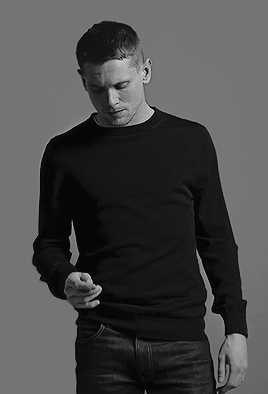According to one US media outlet publicising Unbroken, the Coen Brothers-written, Angelina Jolie-directed film tipped for the Best Picture Oscar, Jack O’Connell “grew up working-class in Derby, England, and has made a name for himself playing louts, punks and convicts”. Well, that’s one way of putting it. Just maybe not to his face.
“I’m always referred to as a normal Derby lad, et cetera,” O’Connell says. “I could almost find those terms offensive. I can consider myself a normal Derby lad, but there’s a tendency for that to appear like it’s an over-importance. I don’t think my example has been any harder than others who have done this path before me.”
Again, that’s one way of putting it, but not every young actor without drama school or university or formal training – whether he’s from the East Midlands or the Lower East Side of Manhattan – ends up being brilliant in three lead roles in three terrific films all released within the space of a calendar year, in the same year he turns 24. But that’s what Jack O’Connell has just done.
His three star turns in 2014 are in Starred Up, ’71 and Unbroken. In the first, O’Connell is a volatile, fuck-you-up-as-soon-as-I-look-at-you young offender moved into adult prison for the first time – what “starred up” means – to do his time alongside the lifelong-con father who abandoned him. In ’71, O’Connell plays a raw British soldier who needs to stay alive on the streets of Belfast for a night after being separated from his comrades during a riot. For Unbroken, he spent three months dieting, and learning a very convincing US accent, to play an Olympic athlete-turned WWII USAAF airman who survives almost seven weeks in a life raft after being shot down in the Pacific, only to end up in a Japanese prisoner of war camp.
All three roles require the difficult skill of conveying a powerful but not overstated physical presence with an underlying, believable humanity. What he does feels real, and he demands your attention. You root for him because he’s heroic in that less immediately obvious way.
Director Angelina Jolie, O’Connell says, “had compassion. She supported me throughout. If I’m watching her treat everyone as an equal, that made me feel exactly like that, too. I spent time with her in the rehearsal period. She set up meetings with my Mum and some of my family. So, by the time we got to the set, it felt like I had a bit of a friend. But it was a massive leap for me, a much more expensive realm of the industry.”
Jolie’s meeting with his mother was to be expected: Alison O’Connell is her son’s manager. “That has its ups and downs,” he says. “I love my Mum to pieces, but sometimes we have to have serious conversations.” O’Connell’s father died six years ago, shortly after his son had filmed Harry Brown, during which Michael Caine told the then-17-year-old that he would be a star.
“Before working with the likes of Michael Caine, I was quite naïve,” O’Connell says. “I had a sports mentality. I was quite competitive, which I don’t like in this field. I don’t think it’s a contest; you can’t contest acting. But when I was a kid, I had this undertone of aggression, this need to be funny or to be heard.
Whereas now, I don’t feel so panicked that I’m chasing my tail anymore. It’s paying off and [I’m] being regarded as, at least, an actor.”
That he is an actor in any capacity now is quite surprising, because he never wanted to be one. As a boy, football or the forces were the career options open to him. Injury put paid to the former when he was a trialist at his beloved Derby County. “It was going my way for a while. Not to sound big-headed,” he says, with a wry chuckle, “but I was banging them in left, right and centre.” His juvenile criminal record, which he won’t discuss so as not to incriminate anyone else, kept him from graduating from the cadets and into the army. “Sometimes I draw from whatever military expectations I had for myself,” O’Connell adds. “That idea of discipline and hierarchy. It certainly gets me out of the bed and onto my mark.”
Compulsory drama lessons at school introduced O’Connell to acting. He loved it, and attended the Television Workshop in Nottingham, from where Samantha Morton and Toby Kebbell moved on to greater things, and Shane Meadows cast many of the young performers in his film This Is England (2006), including O’Connell as Pukey Nicholls. He was 16, skinheaded, and knew what he wanted to do with his life. (He seems genuinely upset when he explains how his schedule has not allowed him to take part in the subsequent This Is England TV series.) Three years later, he was starring in Skins on E4 with increasing, Caine-enabled maturity. He hasn’t stopped growing: filming Unbroken, he says, was the most “maturing” experience of his working life.
Parts of his CV are more typical of today’s young British actor: fleeting appearances in serial dramas (The Bill, Holby City), the Soccer AM sofa and the right-hand column of MailOnline, having been papped for a couple of months in the company of pop star Tulisa Contostavlos. However, they are notes in O’Connell’s margins, not the main story, although he has taken a while to get his head around that.
“When I was coming up five years ago, I used to open magazines and see actors and it used to make me cringe for them. It threw up the question of being genuine. If I look a muppet in old pictures in clothes I’d never wear nowadays, that’s fucking hilarious to me now, as opposed to embarrassing – as long as I speak definitively enough as an actor by the work I do. I don’t want immortality for myself, but I want to leave a print, my urine scent. Lifting my leg on the tree of history.”
Which is one way of putting it.
















